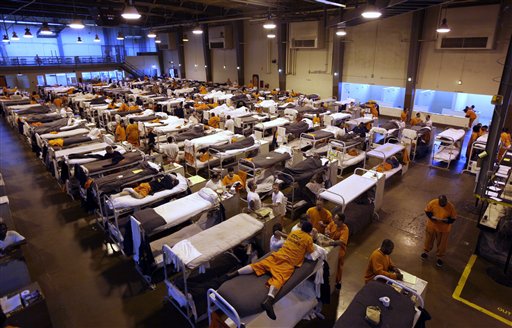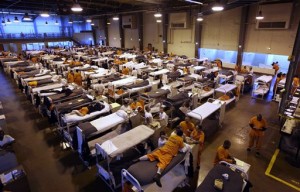
Charles Manson’s Cell Phones
September 29, 2011Student Blogs ArticleCalifornia prisons are no strangers to bad press. Just a few months ago, the Supreme Court condemned the state’s correctional facilities [PDF] for violating inmates’ Eighth Amendment right to be free from cruel and unusual punishment. After Schwarzenegger took the governorship in California in 2003, he expressed outrage at runaway incarceration in California, questioning the state’s moral compass when it “focuses more on prison uniforms than on caps and gowns.”
There is a paradox in the bad press: if we are spending so much on prisons, then how is it that prisoners are still living in conditions so deplorable that they violate the prisoners’ Constitutional rights? It doesn’t add up.
California has a unique villain, an incredibly powerful lobby that has undoubtedly contributed to the severity of the state’s prison problems: the California Correctional Peace Officers Association (CCPOA).
As with any powerful lobby, money talks. The CCPOA has plenty of it—over 97% of the state’s correctional officers are organized, and members pay $59 in monthly dues. With 31,000 members, we’re talking $21.9 million annual income—a veritable arsenal that has been the most valuable player in making the state’s penal system more punitive in nature. “While prison guards can appear as a less-than-sympathetic group in the public eye, the mother of a murdered child serves as a powerful tool when trying to strengthen punitive laws.” CCPOA Info Sheet (PDF).
Even in “maximum-security” prisons, California’s inmates are constantly caught with contraband drugs, weapons, and even cell phones—which enable them to continue posing a threat to communities while locked up. Earlier this year, Charles Manson was caught with a cell phone—his second cell phone in two years—at California’s maximum-security Corcoran State Prison. Just how are the prisoners getting their hands on this contraband? Moreover, how could one of the most infamous criminals in California history get his hands on a cell phone—twice?
The day after news of Manson’s second contraband phone hit newspapers, the Los Angeles Times called prison guards the “main obstacle” in the problem:
“Prison employees, roughly half of whom are unionized guards, are the main source of smuggled phones that inmates use to run drugs and other crimes, according to legislative analysts who examined the problem last year. Unlike visitors, staff can enter the facilities without passing through metal detectors.”
While extensive airport-style security screens are required for all attorneys and inmates’ visitors, security guards are not subject to these searches. When California legislators sought to change this, the politically powerful CCPOA pointed out that they would have to be paid for the extra few minutes that a daily search would add to their workdays. This, according to the CCPOA, would inevitably add up to cost taxpayers millions.
So what is happening now? The guards are still walking in and out of California’s maximum-security prisons every single day without being screened. Moreover, while smuggling cell phones is against prison rules, it isn’t even against the law yet.
According to The Smoking Gun, an online media outlet known for its controversial document leaks, the going rate for a smuggled cell phone in Manhattan-area jails is $2,500. The corrupt guards who benefit from this scheme will lose a huge source of supplemental income should they be forced to undergo security screenings. Given the gains that guards stand to make when public policy is in their favor, it is no surprise that CCPOA’s political activity routinely exceeds that of all other California unions. The CCPOA has a lot to lose.
You may also like
1 comment
- October 2024
- April 2024
- March 2024
- February 2024
- November 2023
- October 2023
- April 2023
- March 2023
- February 2023
- January 2023
- December 2022
- November 2022
- October 2022
- May 2022
- April 2022
- March 2022
- February 2022
- January 2022
- December 2021
- November 2021
- October 2021
- May 2021
- April 2021
- March 2021
- February 2021
- January 2021
- November 2020
- October 2020
- September 2020
- August 2020
- July 2020
- June 2020
- May 2020
- April 2020
- March 2020
- February 2020
- January 2020
- November 2019
- October 2019
- September 2019
- April 2019
- February 2019
- December 2018
- November 2018
- October 2018
- September 2018
- March 2018
- February 2018
- January 2018
- December 2017
- November 2017
- October 2017
- September 2017
- May 2017
- April 2017
- March 2017
- February 2017
- December 2016
- November 2016
- October 2016
- April 2016
- March 2016
- February 2016
- January 2016
- December 2015
- November 2015
- October 2015
- June 2015
- May 2015
- April 2015
- March 2015
- February 2015
- January 2015
- December 2014
- November 2014
- October 2014
- August 2014
- March 2014
- February 2014
- January 2014
- December 2013
- November 2013
- October 2013
- September 2013
- May 2013
- April 2013
- March 2013
- February 2013
- January 2013
- December 2012
- November 2012
- October 2012
- September 2012
- June 2012
- April 2012
- March 2012
- February 2012
- January 2012
- December 2011
- November 2011
- October 2011
- September 2011
- August 2011
- April 2011
- March 2011
- November 2010
- October 2010
- September 2010

In my opinion, this is precisely the kind of thing that happens when one organization — be it a corporation or a union — gains virtually unlimited economic and political control. While there are pluses and minuses to public sector unions, this kind of thing certainly does society a disservice, and I’ll confess I wish there was a way to simply make the CCPOA disappear for the good of both prisoners and non-prisoners alike.